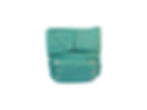Ethical
UnuPana diapers are made in Spain, ensuring ethical conditions for suppliers and partners. We care about our planet and our people.
Easy to use
The two-part diapers dry fast and are easy to put together. Just add the liner(s) into the water resistant cover and click them on.
Ecological
Our cotton absorbents are 100% certified organic cotton. Make the planet a better place for your little ones.
Full Coverage
Designed for the entire diaper period of your mini you. UnuPanas grow with your baby until potty-trained.
UnuPana cloth diapers
Take action with UnuPana cloth diapers!
By choosing cloth nappies you make the planet a better place while keeping your little one away from plastics.

Hook and loop fastener for easy adjustment
Non-plastic buttons. Every step to reduce plastic use is a win!
Double water resistant area to prevent leakages
Click buttons for size adjustment: UnuPanas grow with your little one
How are our UnuPana cloth diapers?
Elastic back waist for comfy fit
Organic cotton inserts / liners: add one, two or three depending on the absorption needs
Wide waist area for
better adjustment during toddler time use
%20copy.jpg)
Plastic diapers wreak havoc on your baby’s planet.
-
6.7 million tons of plastic diapers are generated in the EU per year *estimation for 2017
-
Disposable diapers make up 2.7% of total municipal waste*
-
Choosing washable diapers can spare the environment from almost 1 tone of waste per child**
-
In Europe, around 87% of plastic diapers end up in landfill or are incinerated (13%) causing soil and groundwater contamination, greenhouse gas emissions among other negative environmental impacts
*The environmental & economic costs of single-use menstrual products, baby nappies & wet wipes. Investigating the impact of these single-use items across Europe.
**Policy paper. Zero Waste Europe, April 2021


Plastic diapers contain chemical substances
-
Disposable diapers consist for 61% out of plastic and other plastic mixed materials** that directly touch your baby’s skin and sensitive area*
-
Many manufacturers of disposable diapers do not specify all the ingredients used in the products. Actually, did you know that at the moment there is no such a strict baby diaper specific European regulation whatsoever for their composition, manufacture or placing in the market?
-
A risk assessment conducted by ANSES (French Agency for Food, Environmental and Occupational Health & Safety) showed that under realistic conditions of use, threshold values were exceeded for several chemicals.
-
These analyses detected a number of hazardous chemicals in disposable diapers that could migrate through urine, for example, and enter into prolonged contact with babies’ skin.
*Sécurité des couches pour bébé. Avis révisé de l’Anses. Rapport d’expertise collective. Anses (agence nationale de sécurité sanitaire, alimentation, environnement, travail).
Did you know?
Cloth diapers save your wallet.
-
It is estimated that cloth diapers can spare your wallet up to 1,800Eur for a first child*. This saving is even more significant for subsequent children as the upfront investment has already been done.
*The environmental & economic costs of single-use menstrual products, baby nappies & wet wipes. Investigating the impact of these single-use items across Europe.

How our cloth diapers work
Easy to assemble and easier to wash! Check out our guideline videos





